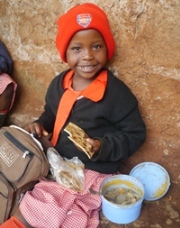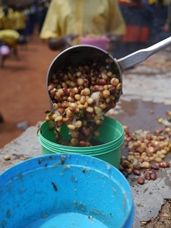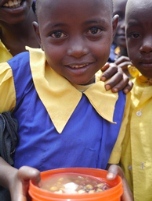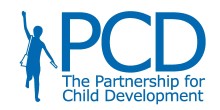 Background
Background  How school feeding benefits Orphans and Vulnerable Children
How school feeding benefits Orphans and Vulnerable Children
 School feeding not only encourages children to get into school but it can also attract new enrolments from marginalised communities, if appropriately targeted on the basis of poverty and food insecurity. It can relieve short-term hunger and tackle micronutrient deficiencies, especially when combined with food fortification and deworming. There is emerging evidence that school feeding can contribute to the enhanced growth of young children, increasing the availability of food or financial resources in the household.
School feeding not only encourages children to get into school but it can also attract new enrolments from marginalised communities, if appropriately targeted on the basis of poverty and food insecurity. It can relieve short-term hunger and tackle micronutrient deficiencies, especially when combined with food fortification and deworming. There is emerging evidence that school feeding can contribute to the enhanced growth of young children, increasing the availability of food or financial resources in the household.
Not only does education provide a solid foundation for continued learning throughout life, but it is also critically important to children’s social integration and psychosocial well-being. School attendance helps children affected by trauma to regain a sense of normalcy and to recover from the impacts of their experiences and disrupted lives.
Extending the reach of school feeding to orphans and vulnerable children can provide a social safety net that helps address issues of inequity and gender imbalance. Keeping these children in school, especially girls, can reduce their vulnerability, including to HIV, and provide educational access of value such as through vocational training in agricultural practices, entrepreneurship and life skills education.
The Current Situation

Globally, an estimated 163 million children are orphaned, having lost one or both parents. Millions more are vulnerable due to the effects of illness and poverty. In the last three decades, the impact of the HIV pandemic has significantly contributed to the increase of orphans and other vulnerable children, a large proportion of who live in developing countries, in particular sub-Saharan Africa, and the majority of who are girls. 17.5 million children are estimated as having been orphaned by HIV and AIDS and over four-fifths (14.2 million) of these children live in sub-Saharan Africa alone.
Children with AIDS may also be at greater risk of contracting HIV sooner, experience stigma and discrimination, as well as the indirect effects of HIV on their community. Orphanhood, whether partial or full, negatively impacts upon outcomes for child development, social integration, health and education.
One tenth of the poorest children globally are least likely to attend school and are most likely to end up in a perpetuation of inter-generational cycles of poverty. Vulnerable children may forgo education for work or household duties, suffer from psychosocial problems and experience greater household poverty. Millions more are vulnerable due to the effects of illness and poverty. Without education, these populations miss the opportunity to acquire the skills to better their own lives.
Reaching Orphans and Vulnerable Children

Within the HGSF initiative, supporting sub-Saharan African Governments as well as stakeholders, (donors and implementing partners supporting national governments) is being undertaken in a transition towards seeing further HGSF OVC policy implementation.
This implementation aims for a more sustainable and multisectoral approach for the extension of school feeding to reach Orphans and Vulnerable Children (OVCs).
At the same time, the support, coordination, management and critical operational research priorities related to the OVC inclusion through HGSF is also being carried out. In this way, support to the most marginalized children will be catalysed, increasing their access to education whilst continuing to support long-term food security, as part of the overall HGSF vision.
Key Documents & Resources
- Promoting Quality Education for Orphans and Vulnerable Children - A Sourcebook
- Does the Provision of Food in School Increase Girls' Enrollment? Evidence from Rural Uganda
- Education and Vulnerability: the Role of Schools in Protecting Young Women and Girls from HIV in South Africa
- Keeping Adolescent Orphans in School to Prevent Human Immunodeficiency Virus Infection: Evidence From a Randomized Control Trial in Kenya
- World Bank Social Protection web page




